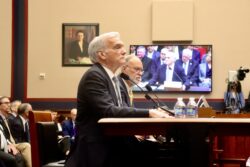The Georgetown University Student Association’s Finance and Appropriations Committee, which now has exclusive control over allocating the Student Activity Fee, is considering cutting funding to the Student Activity Commission unless the organization agrees to the reforms outlined in the Comprehensive Funding Reform bill GUSA passed in November.
In a draft budget released by the Finance and Appropriations committee on Wednesday night, SAC was allocated $12,500 out of its $37,500 request. Depending on how much of its request is granted, SAC may have to spend down its reserves and reduce club funding, according to SAC Chair Ethel Amponsah (NHS ’11).
Money collected from the Student Activities Fee amounts to about $315,000 and is distributed among the five advisory boards and the Georgetown Program Board every year. This year, in addition to stripping the advisory boards of their votes in the allocation process, GUSA implemented a series of new requirements for the boards, forcing them to limit their reserves, establish an appeals process, provide clubs with the option of lump sum funding, hold public meetings with open voting, hold board members accountable through confirmation by the GUSA Senate or approval by club leaders, and allow clubs to keep profits they make from fundraising.
The budget summit on Sunday began at 10 a.m. and lasted until 7 p.m. The final presentation by Amponsah and debate over SAC’s $37,500 budget request lasted well over two hours. The discussion focused on SAC’s reserves and its unwillingness to comply with some of the points of GUSA’s reform bill.
Senators at the meeting noted that SAC had over $200,000 in its reserves, well over the $150,000 recommended by the Vice President’s Office. Last year the Student Activities Fee made up 12.68 percent of the total funds allocated to SAC from the University, with other money coming from tuition dollars and the University’s contract with Coca Cola.
The senators considered denying SAC any funding until it complies with the six points of reform, arguing that the group could make up the loss by drawing on its reserves. Amponsah said she was willing to spend down SAC’s reserves but preferred to do so slowly and to use the money on capital expenditures.
“Of course we can pull money from our reserves to fund allocation, but I don’t see how that’s sustainable,” Amponsah said.
In an interview held after the summit, Amponsah said that SAC believes club leaders are interested in using reserve money to invest in student space and capital resources. If SAC’s funding request was denied entirely, Amponsah said the commission would draw some money from reserves to meet the need, but would also “have to look for other ways to reduce allocations” to clubs.
The Finance and Appropriations Committee also clashed with Amponsah over SAC’s secret votes, which Amponsah said she was unwilling to change, arguing that SAC commissioners must be able to make controversial decisions without fearing negative repercussions.
“That was something I was very adamant about,” Amponsah said. “SAC is charged with administering University policy … the smallest things can be contentious.”
GUSA senators were not convinced by Amponsah’s reasoning.
“It comes with that position,” Senator Greg Laverriere (COL ’12) said. “They should have to stand by what they think is the morally right thing to do.”
After the summit, the committee discussed the possibility of denying SAC any funding from the Student Activities Fee, but most senators were more eager to hash out a compromise. Laverriere said he would be disappointed if SAC didn’t receive any funds from the Student Activities Fee.
“If at the end of the day SAC does not receive an allocation, we have failed,” Laverriere said. “I believe I will have failed in my duties as a GUSA Senator, and I believe SAC will have failed in their duties fighting for clubs.”
At a Finance and Appropriations Committee meeting on Tuesday night the committee again discussed denying SAC at least a large part of its requested allocation. One idea that came up was to provide SAC with half the funds they requested and give them the opportunity to negotiate for the rest.
But Senators Ben Bold (COL ‘13), George Roche (COL ’10), Matthew Hoyt (COL ‘12) and Laverriere argued to fund at least a portion of SAC’s request. Senators Colton Malkerson (COL ’13), Sandy Glassberg (COL ‘11) and Nick Troiano (COL ‘11) argued that SAC should not receive any money, since denying funds for SAC would free up money for other advisory boards, whose requests exceeded the funds available for allocation by $57,000.
The draft budget allocates $42,000 of Georgetown Program Board’s $45,000 request, $61,500 of the Center for Social Justice’s $64,000 request, $115,000 of Club Sports’ $150,000 request, and all of PAAC and Media Board’s respective $25,000 and $36,000 requests.
Opponents of GUSA’s changes to the funding process pointed out that, while GUSA had earlier said it was a conflict of interest for advisory boards to allocate money to themselves, under the new system, the Finance and Appropriations committee allocates money to the GUSA Executive. On Tuesday, the committee allocated $28,000 of the GUSA Executive’s $35,000 request in its draft budget, calling one of their requests to fund “future initiatives” “not specific enough.” Last year, the GUSA Executive received $20,000. The additional money this year will go toward continuing the GUSA Fund.
Once students return from spring break, there will be a one-week period of public comment during which advisory boards can argue for modifications to Wednesday’s draft budget. The Finance and Appropriations Committee will then pass a final draft budget that must then be approved by both the GUSA Senate and the GUSA Executive before it goes into effect.




